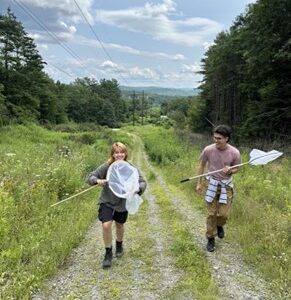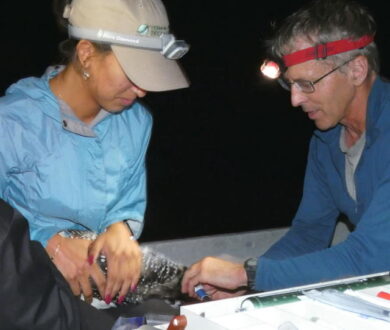
VCE’s 2023 Future Ecologists interns Emily Marple (left) and Pablo Sosa-Negron (middle) sit with 2023 Alexander Dickey Conservation Internship intern Juno Stahl (right) on Mount Mansfield. © Emily Marple
This article is the second in a series highlighting projects made possible by generous contributions to VCE’s ALL IN for Biodiversity campaign.
The ALL IN for Biodiversity campaign is expanding VCE’s capacity and conservation impact by investing in pioneering science, collaborating for conservation outcomes, and broadening our vision for community science.
_______________________________
Ecologists know that ecological communities are strongest and most resilient when they are diverse. In contrast to nature, the field of ecology itself is one of the least diverse fields of science. As an organization that strives to “unite people and science for conservation,” we recognize that to become stronger and more resilient, we must create a culture that embraces diversity and fosters inclusivity. With that goal in mind, the Vermont Center for Ecostudies (VCE) launched our Future Ecologists internship in 2022.
“It’s difficult as an undergrad to break into the field,” explains Ryan Rebozo, VCE’s Director of Conservation Science, “and it’s even harder for students from underrepresented backgrounds.” Each summer, the Future Ecologists internship provides an opportunity for two aspiring ecologists who are underrepresented in ecology to join VCE’s research initiatives. We welcomed our second cohort of Future Ecologist interns in 2023, Pablo Sosa-Negron and Emily Marple. Through careful mentorship from VCE staff members, each gained hands-on experience in data collection and fieldwork that supported the next phase of their professional development.

Pablo and ADCI intern Juno Stahl run uphill while butterflying. © Emily Marple
As the Spatial Science intern, Pablo—who came to VCE from his home in Puerto Rico—worked closely with VCE Data Scientist Michael Hallworth on projects centering maps, GIS, and spatial products. During his summer at VCE, Pablo created maps for the Bicknell’s Thrush project to locate potential MOTUS towers, developed a flight trajectory map for Olive-sided Flycatchers, and worked on species distribution models.
Pablo also proposed an independent project using Ruby-throated Hummingbird data from community science platforms to investigate how human impacts are affecting their migration timing. “Right now, I’m finishing a research paper [based on this work], which I will publish with Mike,” Pablo says. “[From this project,] I got to see the actual writing process of a scientific paper, which I hadn’t officially done before.”
As of February 2024, Pablo is in Costa Rica, preparing to start work toward his master’s degree. “I’m going to use a lot of GIS, so I got a good foundation at VCE,” he says.
Our second Future Ecologists intern, Emily, worked alongside multiple VCE researchers on a series of projects throughout the summer. As a current student in Colorado, she’s studying Organismal Biology with minors in Environmental Studies and Race, Ethnicity, and Immigration Studies. Reflecting on her summer with VCE, Emily comments, “It was great for me to try out many different projects since I don’t have a set goal or niche within ecology that I want to focus on yet.”
That’s precisely what the interdisciplinary intern positions are designed to provide: exposure to an array of projects that build a variety of skills. During Emily’s summer at VCE, she joined Ryan in southern Vermont to collect data for his fire ecology research, helped with data entry, gathered ticks in backyards alongside VCE Conservation Biologist Jason Hill, participated in bird banding on Mount Mansfield, caught butterflies with VCE Staff Biologist Nathaniel Sharp and Conservation Biologist Kent McFarland, and much more.

Emily and VCE loon biologist Eric Hanson band an adult loon. Photo from VCE’s archive
For Emily, one notable highlight was joining VCE loon biologist Eric Hanson in the field. On her second day, they stayed out late into the night to capture and band an adult male loon, and Emily got to hold him in her lap. “It was awesome,” she says. “He bit my leg, but now I can say I was bitten by a loon…. My favorite part was all the hands-on stuff we got to do.”
“I loved this internship so much because I really got to know a lot of people at VCE,” she reflects. “Even if we weren’t on one continuous research project, we got to get to know the researchers. “Every single person I worked with wanted to be a mentor in some way.”
Over the past few years, VCE has carefully considered how to make all of its internships more accessible. “We try to reduce as many barriers to participation as possible,” Ryan says. “That means, for example, providing housing, which is otherwise a challenge for interns to find and afford, helping them acquire the field equipment they need, and paying a competitive rate. Each of these allows us to pull in students from a larger geographic area, not just in Vermont, but from all over.”
“A lot of internships I was considering didn’t even pay close to $15 an hour,” says Emily. “That—and being provided with housing during the internship—was a big deal. If an internship doesn’t provide adequate wages and I have to pay for housing, I can’t make any money. And that is something I need to do to live.”
VCE also provides training in any outdoor skills the interns will need during their program. “We used to require lots of previous experience with camping and in the outdoors,” explains VCE Executive Director Susan Hindinger. “Removing those requirements and providing on-site training opened the doors for students who may not have had opportunities to develop those skills beforehand to gain access to a career in ecology.”
The Future Ecologists internship—an initiative that’s part of VCE’s ALL IN for Biodiversity campaign—will be supported this summer in part by funding from Ted and Paula Richards. Ted was a professor at Norwich University when he and his wife Paula both became interested in VCE’s work. Over the years, they regularly supported VCE’s conservation work and participated in Mountain Birdwatch. In a written statement to VCE, Paula reflects, “Ted would be thrilled to know that a gift in his memory is going to sponsor a summer intern, as his life was devoted to the education of young adults and all things in our precious natural surroundings.”
“In time, ecology will become a much more diverse field,” Ryan says. “It’s happening, but it’s probably happening slower than we’d like. There are things we can do to identify opportunities to include more people in the field than have been included in the past. The future of ecology will have a whole suite of new voices in it, and that will only be good for the field.”
You can read all the articles in this series here.
Watch Episode 1 of Conservation Coffee Hour, featuring a conversation between Susan, Ryan, Pablo, and Emily about the Future Ecologists internship.
_______________________________
VCE is all in for biodiversity. Will you join us by participating in one of our projects or making a special gift to the ALL IN for Biodiversity campaign?
